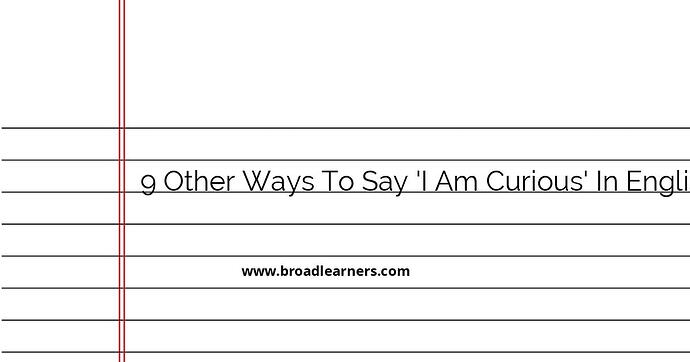Are you looking for other ways to express your curiosity in English? Saying 'I am curious' is a common phrase, but there are many alternative expressions that you can use to convey the same meaning. In this article, we will explore 9 other ways to say 'I am curious' in English.
- I'm interested in
- I'm intrigued by
- I'm fascinated by
- I'm eager to know
- I'm keen to find out
- I'm itching to learn
- I'm dying to know
- I'm really curious about
- I'm burning with curiosity
Let's take a closer look at each of these expressions and see how they can be used in different contexts:
1. I'm interested in
This expression is a versatile way to convey curiosity. It can be used in both formal and informal settings. For example:
I'm interested in learning more about the history of Ancient Egypt.
Here, 'interested in' implies a desire to acquire knowledge or understanding about a particular topic.
2. I'm intrigued by
'Intrigued by' is used when something captures your attention and creates a sense of curiosity or fascination. For example:
I'm intrigued by the mystery surrounding the disappearance of Amelia Earhart.
This expression conveys a strong interest and a desire to learn more about the subject.
3. I'm fascinated by
'Fascinated by' is similar to 'intrigued by' and implies a deep interest or attraction towards a subject. For example:
I'm fascinated by the intricate patterns found in nature.
This expression conveys a sense of wonder and awe.
4. I'm eager to know
'Eager to know' expresses a strong desire to obtain information or knowledge. For example:
I'm eager to know the results of the experiment.
This expression conveys enthusiasm and impatience to learn or discover something.
5. I'm keen to find out
'Keen to find out' indicates a strong interest or curiosity about something. For example:
I'm keen to find out what the surprise announcement is.
This expression conveys a sense of anticipation and excitement.
6. I'm itching to learn
'Itching to learn' implies a strong and intense desire to acquire knowledge or information. For example:
I'm itching to learn more about astrophysics.
This expression conveys a sense of eagerness and impatience.
7. I'm dying to know
'Dying to know' is an informal expression used to convey extreme curiosity or eagerness to learn something. For example:
I'm dying to know who won the competition.
This expression emphasizes a strong desire to obtain information.
8. I'm really curious about
'Really curious about' is a straightforward expression that conveys a genuine interest in a particular topic. For example:
I'm really curious about the origins of language.
This expression indicates a desire to explore and understand a subject in depth.
9. I'm burning with curiosity
'Burning with curiosity' is a figurative expression that suggests an intense and overwhelming desire to know something. For example:
I'm burning with curiosity to know what's inside the locked room.
This expression conveys a sense of urgency and excitement.
These are just a few alternative ways to say 'I am curious' in English. By using these expressions, you can add variety and depth to your conversations and express your curiosity in a more nuanced way.
Did I miss anything? Respond below
